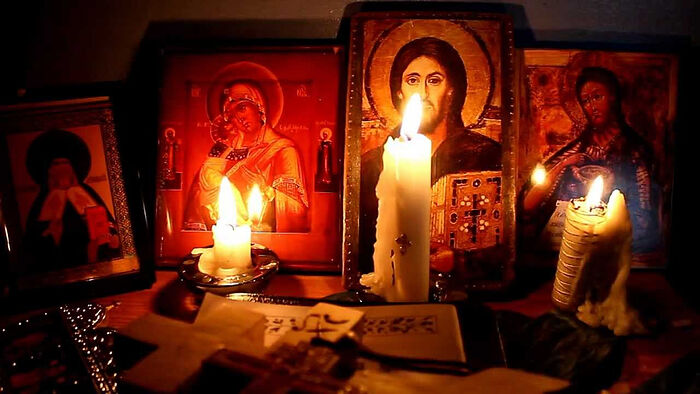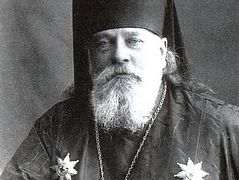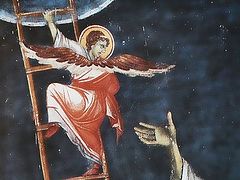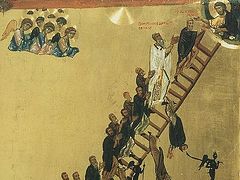All quotes and footnotes are taken from the Holy Transfiguration Monastery 2001 edition of The Ladder of Divine Ascent.
***
You already know from our previous conversations, my brethren, that this Sunday is dedicated in the Church to the laudatory memory of St. John Climacus. You also know that this great honor was bestowed upon him by the Church mainly for the guidance in the spiritual life that many enjoyed from him during his life on Earth, and which he, we can say, immortalized for all of us in his soul-saving work known as The Ladder.
So, it remains for us, in accordance with the Church’s intention, to acquaint you with this Ladder, which, unfortunately, is little known even among those who wouldn’t be against beginning not only a theoretical but also an active ascent up its sacred rungs. The reason for such obscurity of this excellent book could be in part its language—it’s in Slavonic, and therefore not comprehensible to everyone. For while learning many foreign languages for which we have little use, we neglect, to our shame, to study the Slavonic language, despite the fact that it’s the language of our Sacred Scripture, the language of the Church, and the root of our native language. But if there were the desire, then St. John’s Ladder could appear for those who want it and in the language that has become so necessary in their life. For this work, because of its dignity, has long been assimilated by all educated peoples. But we, sacrificing so much to the language of the Gauls, don’t know how and don’t want to extract from it the benefits it could bring us with the spiritual works that are written in it; but, like foolish children, we simply suck sweet poison from it by reading soul-corrupting stories and high-minded dreams.
But let’s turn to St. John’s Ladder, as he called his collection of soul-profiting reflections on the main Christian virtues—mainly those by which our old man, that is, the sin-loving flesh with its passions and vices, is suppressed and mortified within us, and a new, spiritual man, living by faith in God, love, and hope in eternal life, comes to life in its place, and grows and strengthens within us.
This work was compiled for those who have dedicated themselves to the monastic life, but inasmuch as the essence of the work of salvation is one and the same for everyone and consists in cleansing our nature from the evil nesting in it, and in filling it with the grace of God, and with it all the virtues, then St. John’s Ladder is very useful and soul-saving for anyone who wants to be a Christian not merely in words and in name, but in deed.
There are thirty steps or spiritual reflections in The Ladder, according to the number of years of our Lord’s earthly life before His Baptism; for the Lord was baptized and went out to the work of our salvation at no earlier than thirty years of age, and moreover, because it should be assumed that at this time human nature reaches its full age; and we all, according to the Apostle’s instruction, should come to the measure of the age of the fullness of Christ—to which The Ladder leads and facilitates. Therefore, the virtues follow in it one after the other, in their natural order and succession, beginning with the preliminary and lower ones!
This was a brief, external outline of St. John’s work! Would you like to get acquainted with its inner spirit? To do this, in accordance with the Gospel currently being read (Mk. 9:29), where the miraculous power of prayer is depicted in one of the events, we will read the reflection on prayer from his Ladder.
Prayer, by reason of its nature, is the converse and union of man with God, and by reason of its action upholds the world and brings about reconciliation with God; it is the mother and also the daughter of tears, the propitiation for sins, a bridge over temptations, a wall against afflictions, a crushing of conflicts, a work of angels, the food of all the bodiless spirits, future gladness, unending activity, a source of virtues, a means of obtaining graces, invisible progress, food of the soul, enlightenment of the mind, an axe against despair, a demonstration of hope, a cure for sorrow, the wealth of monks, the treasure of hesychasts, the reduction of anger, the mirror of progress, the disclosure of status, an indication of one’s condition, a revelation of future things, a sign of glory. For him who truly prays, prayer is the court, the judgment hall and the tribunal of the Lord before the judgment to come (28.1)
Tell me, who of us could depict the property and power of prayer better and more fully? I’m not speaking of prayerful thoughts and feelings here, but of the many mysteries and miracles of prayer! And how appreciable it is that this whole image of prayer is composed not by the imagination, as often happens with us, but from actual experience! That’s why every word and expression is so full of life!
This is what the holy Ladder then tell us about the various types of prayer:
The work of prayer is one and the same for all, but there are many kinds of prayer and many different prayers. Some converse with God as with a friend and master, interceding with praise and petition, not for themselves but for others. Some strive for greater [spiritual] riches and glory and for confidence in prayer. Others ask for complete deliverance from their adversary. Some beg to receive some kind of rank; others for complete forgiveness of debts. Some ask to be released from prison; others for remission from offences (28.6).
We see here not some conceptual consideration, but spiritual danger! And we could talk about the kinds of prayer, but how? Speculating and assuming, collecting, like beggars, the mites of others’ sayings and experiences, not daring to assert that things happen this way, and not another. St. John has a different language; he speaks firmly and decisively, for what he speaks about in word, he has experiencedin deed.
One of the most important questions about prayer is about what attitude to have in prayer:
If you have ever been under trial before an earthly judge, you will not need any other pattern for your attitude in prayer. But if you have never stood before a judge yourself and have not seen others being cross-questioned, then learn at least from the way the sick implore the surgeons when they are about to be operated on or cauterized (28.8).
The answer is brief, but quite embracing of the whole matter.
Do we need many and eloquent words in prayer?
Do not be over-sophisticated in the words you use when praying, because the simple and unadorned lisping of children has often won the heart of their Heavenly Father. Do not try to be verbose when you pray, lest your mind be distracted in searching for words. One word of the publican propitiated God, and one cry of faith saved the thief. Loquacity in prayer often distracts the mind and leads to phantasy, whereas brevity[1] makes for concentration. If you feel sweetness or compunction at some word of your prayer, dwell on it; for then our guardian angel is praying with us. Do not be bold, even though you may have attained purity; but rather approach with great humility, and you will receive still more boldness. Though you may have climbed the whole ladder of the virtues, pray for forgiveness of sins. Listen to the cry of Paul regarding sinners: Of whom I am chief (28.9-13).
No matter how useful and true this advice is concerning the way of prayer, it can be found in other spiritual guides who have written about prayer as well. But here is the precious advice taught by Climacus regarding this topic, and undoubtedly taken from experience: “If you feel sweetness or compunction at some word of your prayer, dwell on it; for then our guardian angel is praying with us” (28.11).
Are there steps in prayer? There are, says Climacus:
The beginning of prayer consists in banishing by a single thought[2] the thoughts that assault us at the very moment that they appear; the middle stage consists in confining our minds to what is being said and thought; and its perfection is rapture in the Lord (28.19).
Oh, if only the Lord would grant us this final height!
What should those who have yet to acquire the ability to pray do?
Until we have acquired genuine prayer, we are like people teaching children to begin to walk. Try to lift up, or rather, to enclose your thought within the words of your prayer, and if in its infant state it wearies and falls, lift it up again. Instability is natural to the mind, but God is powerful to establish all things. If you persevere indefatigably in this labour, He who sets the bounds to the sea of the mind will visit you too, and during your prayer will say to the waves: Thus far shalt thou come and no further.[3] Spirit cannot be bound; but where the Creator of the spirit is, everything obeys (28.16-17).
St. John most wisely calms those who think that their prayer is fruitless and are disturbed about it:
Do not say, after spending a long time at prayer, that nothing has been gained; for you have already gained something. And what higher good is there than to cling to the Lord and persevere in unceasing union with Him? (28.29).
The holy ascetic also most wisely answers whether we can dare to pray for others before we have the gift of prayer:
Do not decline when asked to pray for the soul of another, even though you have not yet obtained the gift of prayer; because through contrition the faith of the suppliant also frequently saves the one who prays for him. Do not be puffed up if you have prayed for another and been heard, for it is his faith that has been strong and effective (28.36-37).
Must we spend a long time in prayer?
Do not abandon prayer until you see that, by Divine providence, the fire and water[4] have diminished. For perhaps you will not have such a moment for the remission of your sins again in all your life (28.49).
Let us listen to some more, especially noteworthy counsels from St. John regarding prayer:
Do not let the time of prayer be an hour for considering necessary things or even spiritual tasks (28.59).
This counsel is very necessary for some. For just as there are people who completely ignore prayer and are ready to exchange it for the most unimportant and unnecessary things, so there are also people who by a certain predilection for oral prayer abandon even the most important things for its sake, and thereby create a disturbance in the fulfillment of their duties, and thus invite criticism of prayer. The Apostle commands that we pray without ceasing, but how? Not with the lips, but the heart—not just in church, or before an icon, but also while going about our work—everywhere and at all times.
Do not go into detail in confessing carnal acts, lest you become a traitor to yourself (28.58).
Again, important counsel! Once the soul, by the mercy of the Lord, is purified of sins by repentance and enlightened by the grace of the Holy Spirit, then the mere imagination of sins and iniquities, especially of the flesh, will deprive it of part of its mental purity—therefore, it should be avoided. Always remember that you were a great sinner, so as to preserve humility and avoid dreams of your own dignity. But try to forget the details of your sins, so the thought of them, like a spark, doesn’t cause a fire in your sin-loving nature again.
Is there anything you can learn about the actions of your prayer? It’s possible, St. John says:
The assurance of every petition becomes evident during prayer. Assurance is loss of doubt. Assurance is sure proof of the unprovable (28.43).
That means, you only need to be able to observe this sign, and to have the subtlety of the inner spirit for this.
What are the actions of prayer in those who know how to pray?
Some people come from prayer as if they were marching out of a fiery furnace, and feel relief as from some defilement and from all that is material, while others are as if illumined with light and clothed in a garment of joy and humility (28.51).
That’s enough of these brief examples for now.
Is it not true, my brethren, that a work containing such rare spiritual experiences and such extraordinary soul-saving counsel is worth paying attention to and reading, at least out of curiosity, in these days of fasting and repentance? Whoever can do this but doesn’t will punish himself, depriving his soul of the sweetest and healthiest food. But for those who can’t have St. John’s Ladder themselves, let us try to help them by showing it from time to time and offering it from this sacred place for general use.
Amen.




